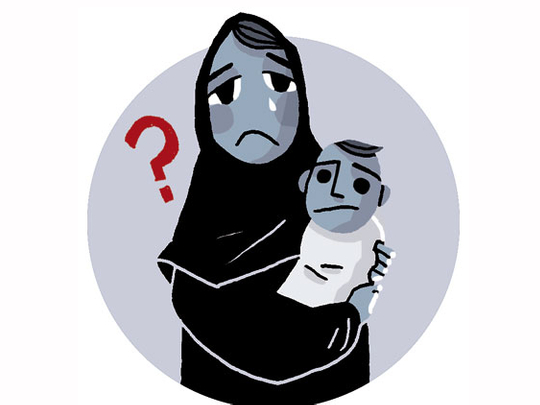
Reports in the Saudi press recently spoke of growing concerns over the number of children fathered by Saudi males during their trips abroad, and abandoned for all practical purposes. And while these overseas paternal distribution of genes are not necessarily restricted purely to Saudis, the number of wives and children left behind is of alarming proportions.
At a conference in Egypt, Aiman Abu Akeel, chairman of the Maat Foundation for Peace and Development, stated that the majority of men who visit Egypt looking for misfar (tourist) marriages tend to be Saudi, followed by Iraqis, and that the women they marry are predominantly younger than them. The misyar or marriage of convenience within the country's borders became very popular after it was sanctioned by some of our religious shaikhs. It was basically a licence to have multiple partners without much guilt or expense. It was soon followed by the misfar and other concoctions as well.
The "misfar" marriage refers to a union contracted so that a woman may cohabitate with her foreign "husband" for the period of time he is visiting a foreign country. These women are usually divorced after a short period which ranges from a week to a month. It is natural that most of these women who are married off come from deprived backgrounds, and for most of them, they have very little say in the matter.
In Egypt, the parents receive up to 4,000 Egyptian pounds from the visitors for sanctioning their approval for a limited time marriage. Most of these girls are below 16 years of age, and do not understand that they are being treated like commodities.
And it's not just in Egypt that such a growing problem exists. There are significant numbers of wives and children abandoned by travelling Saudis in many countries. In Morocco, there are reports of over 5,000 wives and as many children who had been left deserted by their tourist husbands without honour or gratuity.
Legal route
In Syria, Yemen, India, Indonesia and the Philippines, similar numbers exist making it a growing concern for the Saudi government, which is beginning to force moves to make it obligatory for such errant fathers to own up to the responsibility of parenthood. The semi-autonomous consultative Shura Council has been tasked to study the issue of children born of non-Saudi wives and abandoned by their Saudi fathers.
Najeeb Al Zamil, founder of the Back to the Roots Foundation, a nongovernmental organisation that helps Saudi children abroad, said that there are many such children in Arab countries and that the men abandon their temporary wives and children born in these relationships for fear of discovery by their relatives back home.
He added that many children live in miserable conditions and turn to drugs and illegal activities, deprived as they are of their true identity, although there have been others who have grown up and become success stories. He said that some of these children are smart and get educated, but they feel lost because of unrecognised or non-legitimised parenthood.
Al Zamil has called for DNA tests to be recognised as a legitimate means of determining kinship, something that would force a father to admit parenthood. He also said that many of these children are neither in need of financial aid nor do they want to come to the Kingdom but are desperate to be recognised.
Soon after he became the ruler, King Abdullah had ordered that money be paid to the abandoned children of Saudi men. In Morocco the Saudi ambassador said the problem was compounded by the fact that many Saudis marry Moroccan women without their family's knowledge, and blamed the misery of these women on irresponsible Saudis.
"We give the children Saudi nationality if the woman can prove that she was married to a Saudi. The main problem we face is dealing with Saudis who do not cooperate with us. We at the embassy feel great pain toward our sons and daughters who have been abandoned like this. I try every day to call their fathers to solve their problems," he stated.
He added that Saudi embassies have been advised to register children and issue temporary travel documents that allow fathers to bring their children to the Kingdom and arrange passports and ID cards for them. Fathers, however, could be punished for violating the law and that this could be in the form of a travel ban or a prison sentence.
I have always maintained that a major source of blame for this recent phenomenon following the oil boom years rests in part on the shoulders of those Ulema or religious leaders who have sanctioned just about every twisted form of union between man and woman and legitimised it to the degree of making it palatable within the framework of Islam. Don't they possess the wisdom to foresee the sorry end of some of their edicts?
Tariq A. Al Maeena is a Saudi socio-political commentator. He lives in Jeddah, Saudi Arabia.









